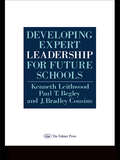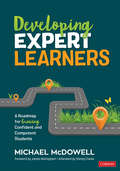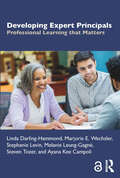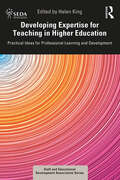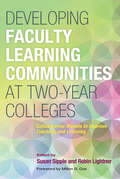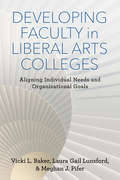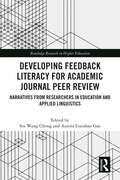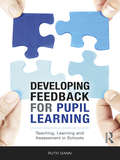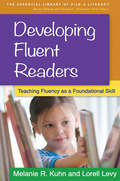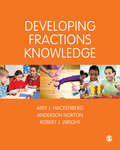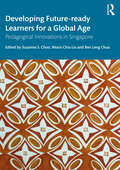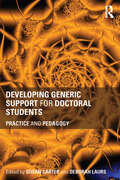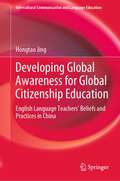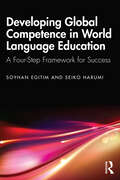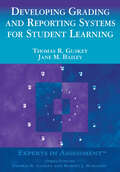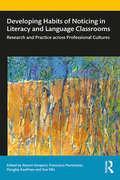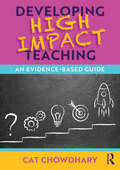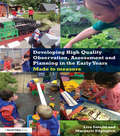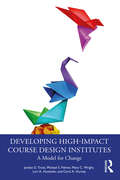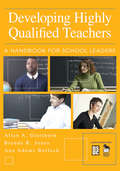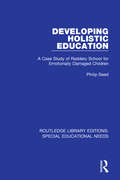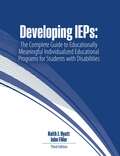- Table View
- List View
Developing Expert Leadership For Future Schools
by Kenneth Leithwood J. Bradley Cousins Paul T. BegleyBased on the authors' research on the behaviour and thinking of school leaders, this volume presents arguments about the natue of expert school leadership. It parallels developments in the field from the early 1980s when the emphasis was on identifying the behaviours of effective principals, to the early 1990s, when the focus shifted to understanding the thinking underlying those behaviours. The ideas contained in this book should be useful in helping practising educationalists develop the skills involved in school leadership.
Developing Expert Learners: A Roadmap for Growing Confident and Competent Students (Corwin Teaching Essentials)
by Michael McDowellFinally— a roadmap for growing students’ confidence and competence in learning. We strive to empower our students to lead their own inquiry, discover knowledge, and construct approaches to solving real-life challenges. Often, though, we make the mistake of designing learning experiences that burden students with the unrealistic expectation of expertise that hasn’t yet been developed. The solution: proper scaffolding for surface, deep, and transfer learning. Building upon the groundwork from Michael McDowell’s book Rigorous PBL by Design, this new resource provides practices that strategically support students as they move from novices to experts in core academics. You’ll learn high-impact strategies that ensure students develop ownership and confidence in their learning, plus essential tools to build your own efficacy and support your colleagues in building collective expertise. Chock full of mission-critical guidance, this book Provides an actionable framework for developing student expertise Offers practical strategies, tools, and routines for creating a culture that cultivates expertise and builds student efficacy Gives a simple, effective unit and lesson template that clarifies the steps students must take to build, deepen, and apply core content knowledge and skills Ensures your students’ progress in their learning through a process for selecting instructional, feedback, and learning strategies Includes strategies for improving your professional expertise individually and collectively "As educators, we are challenged to prepare our students for college and career readiness as they go into the real world. Developing Expert Learners addresses the intentional moves of the teacher to prepare students for challenging work at their level of learning, resulting in students reaching their fullest potential as experts in their own learning." Elizabeth Alvarez, Chief of Schools Chicago Public Schools
Developing Expert Learners: A Roadmap for Growing Confident and Competent Students (Corwin Teaching Essentials)
by Michael McDowellFinally— a roadmap for growing students’ confidence and competence in learning. We strive to empower our students to lead their own inquiry, discover knowledge, and construct approaches to solving real-life challenges. Often, though, we make the mistake of designing learning experiences that burden students with the unrealistic expectation of expertise that hasn’t yet been developed. The solution: proper scaffolding for surface, deep, and transfer learning. Building upon the groundwork from Michael McDowell’s book Rigorous PBL by Design, this new resource provides practices that strategically support students as they move from novices to experts in core academics. You’ll learn high-impact strategies that ensure students develop ownership and confidence in their learning, plus essential tools to build your own efficacy and support your colleagues in building collective expertise. Chock full of mission-critical guidance, this book Provides an actionable framework for developing student expertise Offers practical strategies, tools, and routines for creating a culture that cultivates expertise and builds student efficacy Gives a simple, effective unit and lesson template that clarifies the steps students must take to build, deepen, and apply core content knowledge and skills Ensures your students’ progress in their learning through a process for selecting instructional, feedback, and learning strategies Includes strategies for improving your professional expertise individually and collectively "As educators, we are challenged to prepare our students for college and career readiness as they go into the real world. Developing Expert Learners addresses the intentional moves of the teacher to prepare students for challenging work at their level of learning, resulting in students reaching their fullest potential as experts in their own learning." Elizabeth Alvarez, Chief of Schools Chicago Public Schools
Developing Expert Principals: Professional Learning that Matters
by Linda Darling-Hammond Steven Tozer Marjorie E. Wechsler Stephanie Levin Melanie Leung-Gagné Ayana Kee CampoliStrong school leadership is critical for shaping engaging learning environments, supporting high-quality teachers and teaching, and influencing student outcomes. Developing Expert Principals offers a comprehensive research synthesis to understand the elements of high-quality programs and learning experiences that have been associated with positive outcomes ranging from principals’ preparedness and practices to staff retention and student achievement. This book also offers vivid examples of high-quality programs and examines the extent to which principals have opportunities to participate in effective learning experiences. It examines the policies that drive both the development of high-quality programs and access to them, highlighting successful examples across the country. With practical recommendations throughout, this book is a key resource for educational leaders, faculty and scholars of educational leadership, developers of leadership preparation and training, and policymakers who seek to create a learning system that will better serve principals, the staff they support, and, ultimately, all children.
Developing Expert Principals: Professional Learning that Matters
by Linda Darling-Hammond Steven Tozer Marjorie E. Wechsler Stephanie Levin Melanie Leung-Gagné Ayana Kee CampoliStrong school leadership is critical for shaping engaging learning environments, supporting high-quality teachers and teaching, and influencing student outcomes. Developing Expert Principals offers a comprehensive research synthesis to understand the elements of high-quality programs and learning experiences that have been associated with positive outcomes ranging from principals’ preparedness and practices to staff retention and student achievement. This book also offers vivid examples of high-quality programs and examines the extent to which principals have opportunities to participate in effective learning experiences. It examines the policies that drive both the development of high-quality programs and access to them, highlighting successful examples across the country. With practical recommendations throughout, this book is a key resource for educational leaders, faculty and scholars of educational leadership, developers of leadership preparation and training, and policymakers who seek to create a learning system that will better serve principals, the staff they support, and, ultimately, all children. The Open Access version of this book, available at http://www.taylorfrancis.com, has been made available under a Creative Commons Attribution-Non Commercial (CC-BY-NC) 4.0 license.
Developing Expertise for Teaching in Higher Education: Practical Ideas for Professional Learning and Development (SEDA Series)
by Helen KingThis book provides a contemporary view of the characteristics of expertise for teaching in higher education, based on the strong foundation of research into expertise, and empirical and practical knowledge of the development of teaching in higher education. Taking key themes related to the characteristics of expertise, this edited collection delivers practical ideas for supporting and enabling professional learning and development in higher education as well as theoretical constructs for the basis of personal reflection on practice. Providing an accessible, evidence-informed theoretical framework designed to support individuals wishing to improve their teaching, Developing Expertise for Teaching in Higher Education considers teaching excellence from an expertise perspective and discusses how it might be supported and available to all. It invites a call to action to all policymakers and strategic leaders who make a claim for teaching excellence to consider how professional learning and the development of expertise can be embedded in the culture, environment and ways of working in higher education institutions. Full of practical examples, based on scholarship and experience, to guide individual teachers, educational developers and policymakers in higher education, this book is a must-read text for those new to teaching in higher education and those looking to improve their practice.
Developing Faculty Learning Communities at Two-Year Colleges: Collaborative Models to Improve Teaching and Learning
by Susan Sipple Robin LightnerThis book introduces community college faculty and faculty developers to the use of faculty learning communities (FLCs) as a means for faculty themselves to investigate and surmount student learning problems they encounter in their classrooms, and as an effective and low-cost strategy for faculty developers working with few resources to stimulate innovative teaching that leads to student persistence and improved learning outcomes.Two-year college instructors face the unique challenge of teaching a mix of learners, from the developmental to high-achievers, that requires using a variety of instructional strategies and techniques. Even the most experienced teachers can find this diversity demanding.Faculty developers at many two-year colleges still rely solely on the one-day workshop model that, while useful, rarely results in sustained student-centered changes in pedagogy or the curriculum, and may not be practicable for the growing cohort of part-time faculty members.By linking work in the classroom with scholarship and reflection, FLCs provide participants with a sense of renewed engagement and stimulate collegial exploration of ways to achieve educational excellence. FLCs are usually faculty-instigated and cross-disciplinary, and comprise groups of six to fifteen faculty that work collaboratively through regular meetings over an extended period of time to promote research and an exchange of experiences, foster community, and develop the scholarship of teaching. FLCs alleviate burnout and isolation, promote the development, testing, and peer review of new classroom strategies or technologies, and lead to the reenergizing and professionalization of teachers.This book introduces the reader to FLCs and to the Scholarship of Teaching and Learning, offering examples of application in two-year colleges. Individual chapters describe, among others, an FLC set up to support course redesign; an “Adjunct Connectivity FLC” to integrate part-time faculty within a department and collaborate on the curriculum; a cross-disciplinary FLC to promote student self-regulated learning, and improve academic performance and persistence; a critical thinking FLC that sought to define critical thinking in separate disciplines, examine interdisciplinary cross-over of critical thinking, and measure critical thinking more accurately; an FLC that researched the transfer of learning and developed strategies to promote students’ application of their learning across courses and beyond the classroom. Each chapter describes the formation of its FLC, the processes it engaged in, what worked and did not, and the outcomes achieved.Just as when college faculty fail to remain current in their fields, the failure to engage in continuing development of teaching skills, will equally lead teaching and learning to suffer. When two-year college administrators restrain scholarship and reflection as inappropriate for the real work of the institution they are in fact hindering the professionalization of their teaching force that is essential to institutional mission and student success.When FLCs are supported by leaders and administrators, and faculty learn that collaboration and peer review are valued and even expected as part of being a teaching professional, they become intrinsically motivated and committed to collaboratively solving problems, setting the institution on a path to becoming a learning organization that is proactive and adept at navigating change.
Developing Faculty in Liberal Arts Colleges: Aligning Individual Needs and Organizational Goals (The American Campus)
by Vicki L. Baker Laura Gail Lunsford Meghan J. PiferDeveloping Faculty Members in Liberal Arts Colleges analyzes the career stage challenges these faculty members must overcome, such as a lack of preparation for teaching, limited access to resources and mentors, and changing expectations for excellence in teaching, research, and service to become academic leaders in their discipline and at these distinctive institutions. Drawing on research conducted at the thirteen institutions of the Great Lakes Colleges Association, Vicki L. Baker, Laura Gail Lunsford, and Meghan J. Pifer propose a compelling Alignment Framework for Faculty Development in Liberal Arts Colleges to show how these colleges succeed—or sometimes fail—in providing their faculties with the right support to be successful.
Developing Feedback Literacy for Academic Journal Peer Review: Narratives from Researchers in Education and Applied Linguistics (Routledge Research in Higher Education)
by Sin Wang Chong Aurora Lixinhao GaoThis edited volume showcases first-hand accounts of crafting and handling feedback during the peer review process from early career researchers (ECRs), journal editors and experienced reviewers to develop the concept of ‘feedback literacy’ in academic peer review contexts.This novel collection of research uses personal reflections, disseminations of good practices, research syntheses and small-scale primary studies to highlight implications for feedback practices, demonstrating how academics’ capacity, disposition and skills in providing and engaging with constructive, professional and actionable feedback are crucial to ensure a comprehensive and worthwhile process. Chapters draw attention to the need for academics to develop feedback literacy, both at the ECR level and for more experienced peer reviewers, journal editors and authors, furthering discussion on improvement strategies and solutions to current feedback practices.Reimagining journal peer review as an inclusive and sustainable participatory system, this book will appeal to scholars and researchers working in higher education and educational assessment. There will be particular interest among postgraduate students and ECRs across the Arts, Humanities and Social Sciences disciplines for whom journal peer review has a particular relevance.
Developing Feedback for Pupil Learning: Teaching, Learning and Assessment in Schools
by Ruth DannFeedback is often considered to be one of the pivotal enablers of formative assessment. This key topic has received considerable attention within research literature and has been studied by a number of leading experts in the field. This book is positioned at the heart of these debates and offers a specific contribution to ‘exploring’ and ‘exploiting’ the learning gap which feedback seeks to shift. Developing Feedback for Pupil Learning seeks to synthesise what we know about feedback and learning into more in-depth understandings of what influences both the structure of and changes to the learning gap. This research-informed but accessibly written enquiry is at the very heart of teaching, learning and assessment. It offers a timely contribution to understanding what works (and what doesn’t) for whom and why. Split into three main parts, it covers: Feedback for learning in theory, policy and practice; Conceptualising the ‘learning gap’; New futures for feedback. This text will be essential reading for students, teachers, researchers and all those who engage with issues related to teaching, learning and assessment academically.
Developing Fluent Readers: Teaching Fluency as a Foundational Skill (The Essential Library of PreK-2 Literacy)
by Lorell Levy Melanie R. KuhnViewing fluency as a bridge between foundational skills and open-ended learning, this book guides teachers through effective instruction and assessment of fluent reading skills in the primary grades. Fluency's relationship to phonological awareness, phonics, and print concepts is explained, and practical methods are shared for integrating fluency instruction in a literacy curriculum grounded in the Common Core State Standards (CCSS). Classroom examples, weekly lesson plans, and extensive lists of recommended texts add to the book's utility for teachers.
Developing Fractions Knowledge (Math Recovery)
by Robert J Wright Anderson Norton Amy J HackenbergSupporting and understanding your students' fractional knowledge is crucial to their overall grasp of numbers and mathematics. By centralising around three key stages of development, this effective guide will help you to assess your students' understanding of fractions and modify your teaching accordingly. These key stages are identified as: · Stage 1a: Fair Sharing · Stage 1b: Part-Whole · Stage 2a: Disembedding and Iterating · Stage 2b: Measuring with Unit Fractions · Stage 2c: Reversing Fractions · Stage 3a: Fractions as Numbers · Stage 3b: Operating with Fractions As the newest addition to the bestselling Maths Recovery series, this book will be a useful guide for all primary classroom teachers and assistants, including experienced Mathematics Recovery instructors.
Developing Future-ready Learners for a Global Age: Pedagogical Innovations in Singapore (Routledge Research in Teacher Education)
by Woon Chia Liu Suzanne S. Choo Bee Leng ChuaSuzanne S. Choo, Woon Chia Liu, and Bee Leng Chua offer a dynamic look into the tripartite relationship between education research, policy, and practice that characterizes Singapore’s changing education landscape.Over the years, Singapore has garnered increasing attention internationally for its world-class education system. Pushing back against the stereotypical notions of exam- and teacher-centric education in Asia, the contributors to this volume discuss opportunities as well as challenges in Singapore’s innovation towards constructivist, critical, culturally responsive, and cosmopolitan forms of learning. Highlighting the pedagogical innovation and its context in Singapore’s teacher education and schools, the authors bridge theory and practice by providing an understanding of innovative practices informed by key shifts in Singapore's education policies and the key conceptual principles informing these practices. More importantly, it provides on-the-ground empirical insights into the ways these innovative pedagogical practices are enacted in the classroom and in teacher education programmes. Each chapter provides an in-depth understanding of how these pedagogies are applied across various subject disciplines, including guided problem-solving in Mathematics, games-based pedagogy in Science, multimodal literacies in language, ethical criticism in Literature, Nonlinear Pedagogy in Physical Education, multicultural approaches in music, and dialogic pedagogy in drama, among others.Balancing theoretical and empirical focus, this resourceful text will be of interest to students, researchers, and practitioners in educational development, pedagogy, and teacher education, as well as policymakers across international fields in education.
Developing Generic Support for Doctoral Students: Practice and pedagogy
by Susan Carter Deborah LaursThis multidisciplinary, multi-voiced book looks at the practice and pedagogy of generic, across-campus support for doctoral students. With a global imperative for increased doctoral completions, universities around the world are providing more generic support. This book represents collegial cross-fertilisation focussed on generic pedagogy, provided by contributors who are practitioners working and researching at the pan-disciplinary level which complements supervision. In the UK, funding for two weeks annual training in transferable skills for each doctoral scholarship recipient has caused an explosion of such teaching, which is now flourishing elsewhere too; for example, endorsed by the Carnegie Initiative on the Doctorate in the USA and developed extensively in Australia. Generic doctoral support is expanding, yet is a relatively new kind of teaching, practised extensively only in the last decade and with its own ethical, practical and pedagogical complexities. These raise a number of questions: How is generic support funded and situated within institutions? Should some sessions be compulsory for doctoral students? Where do the boundaries lie between what can be taught generically or left to supervisors as discipline-specific? To what extent is generic work pastoral? What are its main benefits? Its challenges? Its objectives? Over the last two decades supervision has been investigated and theorised as a teaching practice, a discussion this book extends to generic doctoral support. This edited book has contributions from a wide range of authors and includes short inset narratives from academic authorities, accumulatively enabling discussion of practice and the establishment of a benchmark for this growing topic.
Developing Global Awareness for Global Citizenship Education: English Language Teachers’ Beliefs and Practices in China (Intercultural Communication and Language Education)
by Hongtao JingThis book has explored in depth the beliefs and practices of foreign language teachers regarding global awareness in the context of a Chinese senior high school. This book defines global awareness as a combination of global knowledge, global attitudes, and global skills for a global citizen to act from the local community to the global community. By analysing qualitative data such as classroom observations, interviews and focus groups with language teachers and linking these findings to language education policy and practice in China, this book has explored how English language teachers teach English language, intercultural communicative competence and global awareness in China. This book will be of interest to researchers, language teachers and students in the fields of language education and intercultural communication. It also provides a readable overview for those new to the field of ICC and global citizenship education.
Developing Global Competence in World Language Education: A Four-Step Framework for Success
by Soyhan Egitim Seiko HarumiThis book presents a four-step framework to help English as a world language (EWL) learners successfully develop global competence, which is defined as the skills, values, and behaviors that prepare young people to thrive in diverse environments. The book showcases practical methods and strategies supported by autoethnography and empirical studies to detail the four elements of the framework towards developing global competence: English language proficiency, cross-cultural knowledge, adopting flexibility in oral communication, and embracing values beyond our horizons. While the English language and culture provide essential input for effective communication, developing flexibility in communication styles and viewing conflict as an opportunity for growth can help L2 learners navigate intercultural encounters more effectively and achieve cross-cultural adaptation. This text will be beneficial to language learners, intercultural communication majors, researchers, and educators in TESOL/EFL/ESL programs, as well as in-service teachers of English language learners (ELLs).
Developing Grading and Reporting Systems for Student Learning (Experts In Assessment Series)
by Thomas R. Guskey Jane M. BaileyTeachers, parents, students, administrators, and community members all agree that we need better grading and reporting systems. Often, these systems are inadequate because they are part of a tradition that can go unexamined and unquestioned for years. Here is the first serious look at the issue, written to provide all those involved — especially teachers — with a coherent and thoughtful framework. Guskey and Bailey offer four pillars of successful grading and reporting systems: Communication is the primary goal of grading and reporting Grading and reporting are integral parts of the instructional process Good reporting is based on good evidence Creating change in grading and reporting requires creating a multi-faceted reporting system Written to help readers develop a deeper and more reflective understanding of the various aspects of the subject, Thomas Guskey and Jane Bailey′s work brings organization and clarity to a murky and disagreement-filled topic. Here is a practical and essential guide for teachers, administrators or anyone concerned with understanding and implementing best practices in grading and reporting systems.
Developing Grading and Reporting Systems for Student Learning (Experts In Assessment Series)
by Thomas R. Guskey Jane M. BaileyTeachers, parents, students, administrators, and community members all agree that we need better grading and reporting systems. Often, these systems are inadequate because they are part of a tradition that can go unexamined and unquestioned for years. Here is the first serious look at the issue, written to provide all those involved — especially teachers — with a coherent and thoughtful framework. Guskey and Bailey offer four pillars of successful grading and reporting systems: Communication is the primary goal of grading and reporting Grading and reporting are integral parts of the instructional process Good reporting is based on good evidence Creating change in grading and reporting requires creating a multi-faceted reporting system Written to help readers develop a deeper and more reflective understanding of the various aspects of the subject, Thomas Guskey and Jane Bailey′s work brings organization and clarity to a murky and disagreement-filled topic. Here is a practical and essential guide for teachers, administrators or anyone concerned with understanding and implementing best practices in grading and reporting systems.
Developing Habits of Noticing in Literacy and Language Classrooms: Research and Practice across Professional Cultures
by Sue Ellis Alyson Simpson Francesca Pomerantz Douglas KaufmanNoticing is an essential aspect of professional expertise in teaching – a skill that draws on deep professional knowledge in ways that affect how teachers are aware of, respond to and meet the needs of their students. Being a ‘noticing teacher’ in the language and literacy classroom can make a real difference to students’ progress as readers and writers, to their literacy attainment and to their engagement with learning. This international, research-informed book is unique in its focus on literacy and language. The authors explore models and methods to embed both noticing and the development of teacher agency and grounded knowledge into teacher education programs and school practices. To further the professional knowledge and agency of ‘noticing teachers’, the authors argue that research, policy and the professional community need to understand how noticing skills can be woven into the policy and practice contexts of the literacy teacher’s work. Developing Habits of Noticing in Literacy and Language Classrooms: Research and Practice across Professional Cultures is designed to help teachers, researchers and school leaders think in new ways about how ‘noticing’ operates in the context of the literacy classroom and how it can be supported. Each chapter provides a valuable insight into how teachers learn from their students, in the course of teaching activities, to be responsive, analytical and inspirational.
Developing High Impact Teaching: An Evidence-Based Guide
by Cat ChowdharyThis vital book delves into key teaching strategies that drive student progress and enhance classroom learning. Both accessible and practical, it demonstrates how building routines and structures allows teachers to have a lasting positive impact on student’s learning and offers the tools to ensure students feel supported and engaged throughout their learning journey.Working as a practical guide for teachers at all stages, these chapters delve into topics such as delivering clear instructions, fostering metacognitive skills, assessing progress effectively, and leading impactful learning. Developing High Impact Teaching offers valuable advice on how to develop your students as active learners and participants in their own education, how to set up impactful routines and good learning habits, how to give clear instructions so students understand what success looks like, and how to use cognitive acceleration techniques to improve learning. It is an essential resource for any busy classroom teacher or school.Designed with newly qualified teachers and those looking to refine their approach in mind, it emphasises evidence-based techniques rooted in Visible Learning principles. Through actionable advice and relatable insights, this book serves as an invaluable resource for educators seeking continuous growth and classroom success.
Developing High Quality Observation, Assessment and Planning in the Early Years: Made to measure
by Margaret Edgington Lisa SancisiWhat is meant by high quality observation in the early years? How do you devise effective next steps for young children that build on their interests? How do you ensure that you meet the needs of all the children in your care? Offering a fresh approach, this practical toolkit offers a complete guide to observation, planning and assessment in the early years. It clearly explains the principles of good practice in this area and provides training tools to help practitioners develop their knowledge and skills and embed these principles into their setting. The focus throughout is on helping practitioners to create their own systems for observation, planning and assessment that are appropriate for the children they work with. All the material in the book has been fully tried, tested and proven to work and the methods described can be tailored to meet the needs of individual practitioners. Featuring a wide range of case studies to illustrate how the principles work in practice, the book includes: Making effective observations and assessments Recognising the characteristics of effective learning Ways to engage parents in their children’s learning How to identify next steps and learning priorities Dealing with barriers and maintaining quality over time With fully photocopiable resources throughout and including downloadable training sessions to accompany the book, this is an essential toolkit for all early years managers, leaders and those involved in setting support.
Developing High-Impact Course Design Institutes: A Model for Change
by Jordan D. Troisi Michael S. Palmer Mary C. Wright Lori A. Hostetler Carol A. HurneyDrawing on the authors’ extensive experience and robust survey data, this critical resource unpacks the inner workings of one of the most powerful mechanisms for improving teaching and learning in higher education: the course design institute (CDI).CDIs are intensive, often multi-day facilitated experiences where instructors design or redesign a course based on learning-focused and equity-minded teaching and learning principles. This resource offers a comprehensive introduction to CDIs, discussing both key elements and why they are worth the time and investment to design, implement, and assess. The chapters cover the values, structures, and approaches that designers use to develop CDIs, along with evidence of their transformative impact on instructors and institutional teaching cultures. The book also provides institutional leaders the rationale and evidence needed to support investment decisions.Developing High-Impact Course Design Institutes is a playbook providing educational developers with the critical background knowledge and vetted direction needed to launch or refine their own CDIs.
Developing Highly Qualified Teachers: A Handbook for School Leaders
by Allan A. Glatthorn Brenda K. Jones Dr Ann Adams BullockThis handbook clearly explains the concept of "highly qualified teachers" as described by No Child Left Behind, and discusses how to recruit, develop, and retain such teachers.
Developing Holistic Education: A Case Study of Raddery School for Emotionally Damaged Children (Routledge Library Editions: Special Educational Needs #47)
by Philip SeedFirst published in 1992. At one level, this book is about the care and education of children with very special needs. The needs result from emotional damage which impinges on their lives both at school and at home. At another level, it is about the development of a holistic approach to education – applicable to all children generally. The first part of the book describes the Raddery experience – a school set up in 1979 based on a holistic and therapeutic community approach to children with special needs. The second part of the book examines the implications of the Raddery experience for educational and child-care policy and practice at a time when there has been growing emphasis on integrating children with special needs into mainstream schools. Are the needs of the children at Raddery very different from others who have been successfully retained in normal classes? If Raddery, and schools like it, have a particular contribution, what is their secret? Can it be shared with ordinary schools?
Developing IEPs: The Complete Guide to Educationally Meaningful Individualized Educational Programs for Students with Disabilities
by Keith J. Hyatt John FillerThis book focuses on the IEP process from both procedural and substantive perspectives as it relates to students from 3 through 21 years of age (information is congruent with the 2017 U. S. Supreme Court decision in Endrew F. v. Douglas County School District). The text stresses the interrelated aspects of IEPs, continuing to mention and discuss its various components as the text progresses. Filled with practical material that readers can immediately apply, Developing IEPs provides a valuable reference that helps students demystify the subject both in and out of the classroom. The Second Edition of Developing IEPs includes: reproducible forms, hyperlinks for important resources, checklists to ensure you develop educationally relevant and legally compliant IEPs, updates on IEP team responsibilities for bullying and harassment, extensive coverage of postsecondary transition planning.
